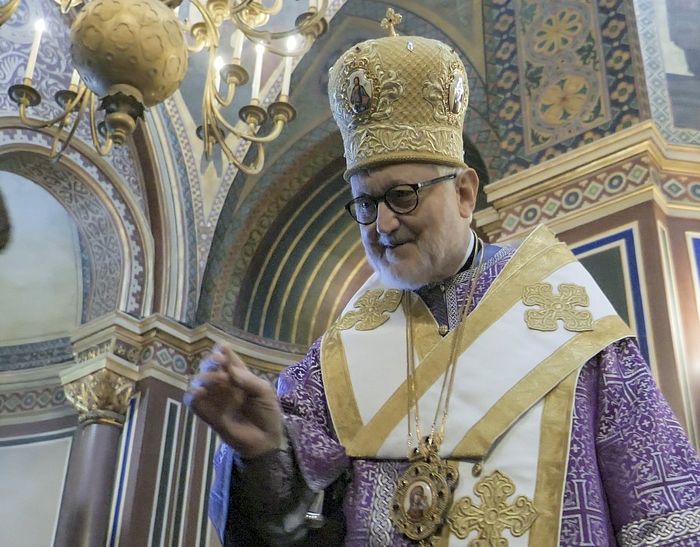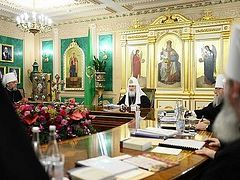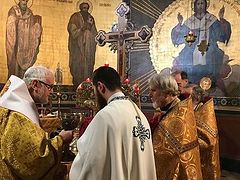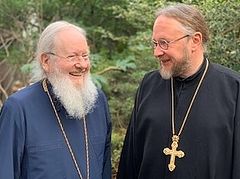Paris, March 25, 2020
His Eminence Metropolitan John of Dubna, the ruling hierarch of the Archdiocese of Russian Churches of Western Europe, could not accept the Patriarchate of Constantinople’s dissolution of the Exarchate in late 2018 because that would have meant abandoning the Archdiocese’s pan-Orthodox history of missionary work in favor of joining Greek Metropolises focused simply on serving diaspora Greeks, as he explained in a recent interview.
Met. John offered insight into the Archdiocese’s decision to return to the Moscow Patriarchate after its exarchate status was suddenly removed by Constantinople in a recent interview published in Russian translation on Sobor.by.
Recounting the history of the Archdiocese in the years after the Russian revolution, the Metropolitan noted that although it began with an aim to serve the Russian diaspora in Western Europe, “observing the life of Russian Orthodox people, many new people of different nationalities who previously professed a different religion joined our communities.”
“Therefore, we can say that our parishes became missionaries throughout the European territory,” he added.
And further:
This is our Church mission—to gather the Orthodox. We are very open about language: We have parishes with French, parishes with Russian, and parishes that use 3 or 4 languages. We have communities that live on the old calendar, and there are those that live on the new calendar. And when we unite at meetings of the clergy, it gives us a very joyful atmosphere, an atmosphere of mission: We are here to testify that the Orthodox Church is an open Church, a living Church, a Church that is able to receive all those people who want to live in the Spirit, in the Orthodox Tradition, and participate in the Orthodox Liturgy.
Asked what he thinks compelled Patriarch Bartholomew of Constantinople to suddenly and unexpectedly order the dissolution of the Archdiocese, with its parishes to move to the corresponding Greek Metropolises throughout Europe, Met. John responded that he still asks himself that question.
“We still don’t have a clear answer,” he said.
They were told only that the Greek-tradition Metropolitans of Constantinople throughout Europe did not want to have the Archdiocese overlapping on their territory, and thus the Russian-tradition parishes were to move under the Greek bishops, the Archdiocesan hierarch explained.
“It was extremely difficult for us to accept that the Archdiocese should disappear and its mission should dissolve. Each separate parish would have had to become part of a Metropolis whose spirit does not correspond to our own,” Met. John explained.
This difference in spirit was explicitly stated to him many times over the years, he testified: “I must tell you that when I visited the residence of the Patriarch of Constantinople in Istanbul, I was always told that we are not here to do missionary work: We are here to deal with the Christians of the Greek tradition.”
“This was their leitmotif, and there was no question of a mission,” he added.
On the other hand, “From the very beginning, the Archdiocese had a missionary vocation, and we wanted to follow it. And that’s why we didn't want to destroy our Archdiocese legally. We wanted to preserve its integrity, and it remains so today,” in the Moscow Patriarchate, the hierarch affirmed.
“There was a rejection of the Archdiocese with its openness and missionary aspirations, and a desire to include our parishes in the Metropolises of the Patriarchate of Constantinople. But this would destroy the spirit of the Archdiocese —the spirit of co-operation and freedom,” Met. John continued.
He also notes that many in the Archdiocese disapproved of Constantinople’s actions in Ukraine, and that he himself felt that Constantinople acted very poorly, haphazardly introducing division.
There is no way out of the present situation, Met. John believes, unless Patriarch Bartholomew acknowledges that his prerogatives exist only within an atmosphere of synodality.
OrthoChristian earlier reported that Met. John has “re-ordained” two priests coming from the Ukrainian schismatics, as they received no canonical ordination outside the Church.




